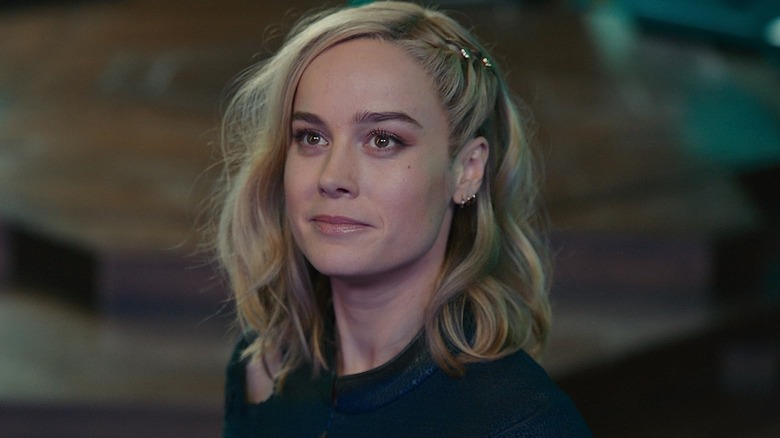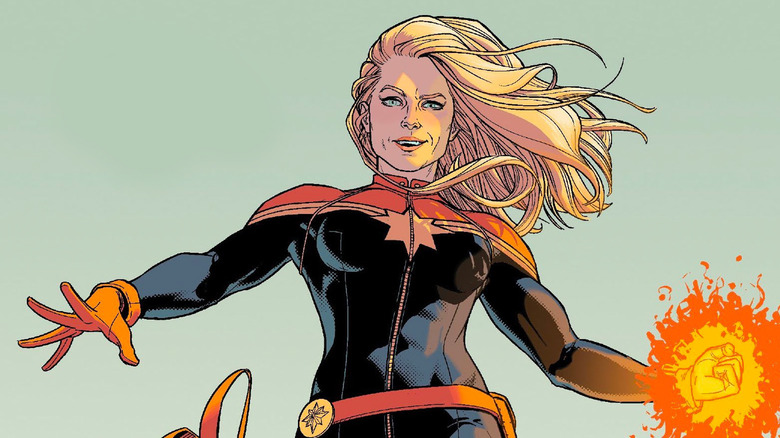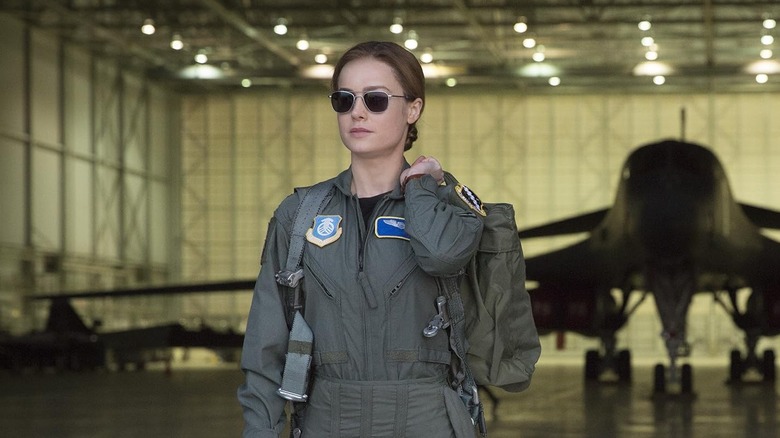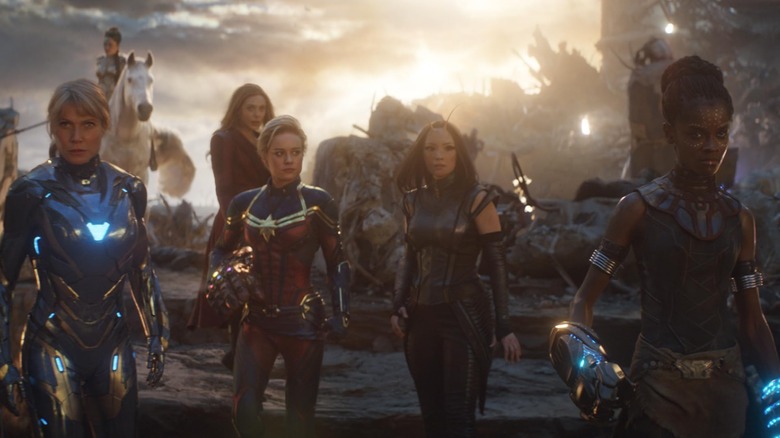Captain Marvel's MCU Movie Cost The Comics Their Most Important Writer
Captain Marvel is a superhero who has gone through some tumultuous times. The character otherwise known as Carol Danvers might be an A-lister now, but it took a long time to grant her the status she's since become synonymous with. When she first debuted in "Marvel Super-Heroes" #13 back in 1987, Carol was known as Ms. Marvel. She was created, in part, to capitalize on the women's liberation movement that had been taking the country by storm for nearly 20 years — but the effects of the movement wouldn't create lasting change for her character for a while.
Carol's bizarre journey was recently catalogued in the insider book "MCU: The Reign of Marvel Studios." It didn't take long for her to get her own solo series, "Ms. Marvel," in the late '70s, but she was frequently written by men, few of whom fully understood the feminist movement they were meant to be embodying. "If you look at the comics, the further you go back, the less clothes Carol Danvers seems to be wearing," said Kevin Feige, president of Marvel Studios. "Oftentimes it's a one-piece bathing suit, basically."
Some of Carol's most infamous storylines are similarly problematic, culminating in 1980's "The Avengers" #200. The issue saw Carol abducted, brainwashed and impregnated by a time-traversing alien. It's stomach-churning stuff; the veritable rock bottom of her comic book history. Though not every storyline would use Carol in such abysmal ways, it would take years for Ms. Marvel to become Captain Marvel, eschew her skimpy costume, and find some semblance of autonomy. That transition can be credited largely to one writer in particular, Kelly Sue DeConnick. Without her celebrated run for the character, the Carol Danvers we all know and love might never have existed, and the film "Captain Marvel" would likely look very, very different.
Introducing Captain Marvel
The reinvention of Carol Danvers was essentially a movement spearheaded by DeConnick. The writer has been pretty candid about the lack of resources at Marvel when she was first tapped to pen a new Carol Danvers series. "It was a C-list character and a C-list writer, and a brand new artist," DeConnick told The Daily Beast in 2018. "We had so little chance of being successful that I didn't actually plan past the sixth issue."
Marvel didn't have much faith in the series' success, and so very little resources were dedicated to marketing. DeConnick herself commissioned artist Jamie McKelvie for Carol's redesign, promising to pay out of her own pocket if Marvel failed to do so. Fortunately, Marvel did end up paying for McKelvie's new design, which outfitted Carol in a red, blue, and gold flight suit. It even incorporated a sash that called back to Carol's days as Ms. Marvel.
DeConnick's run went on to defy all expectations. Bowing in 2012, the new and improved "Captain Marvel" sold out almost instantly, garnering a "legion" of fans called the Carol Corps, and later serving as a template for Marvel Studios' own version of Captain Marvel.
It didn't take long for Marvel to announce its plans for a Captain Marvel film, but by that time, DeConnick felt like it was time to step back from the character. "I quit about a week after the film was announced," she told the "MCU" writers. "There was a bit of a Machiavellian sense to it: I either have to dig in and stay on this book for three years and the quality cannot drop, or I leave right now and get the credit for making the movie happen and walk away at the high point."
'Piss and vinegar'
While DeConnick seemed ready to say goodbye to Captain Marvel, Marvel itself wasn't done with DeConnick. Shortly after departing from Marvel Comics, the writer was invited to a powwow with Feige, producer Jonathan Schwartz, and development head Mary Livanos. Together, they discussed the intricacies of Carol's character, and things seemed to go off without a hitch — save for one disagreement with Feige that nagged at DeConnick on the flight home:
"I said, "The thing about Carol is she always gets back up.' Kevin was like, 'No, that's Cap.' He even says that: "I could do this all day," right?' I was like, 'Yeah, but it's Carol,' but I didn't articulate the difference very well, which bothered me."
It wasn't until DeConnick was back home in Portland, Oregon, that she found the words to succinctly describe Carol's character, and what sets her apart from Steve Rogers. The two actually share a lot of similarities: both are soldiers, and both have a strong sense of empathy and morality. Both are surprisingly resilient, always getting back on their feet after they're knocked down.
"The difference is, Steve gets back up because it's the right thing to do," DeConnick continued. "Carol gets back up — well, the thing I say has a curse word in it, which Disney loves — but Carol gets back up because f*** you. Carol gets up not because it's righteous or just, but because she's full of piss and vinegar."
A spiritual successor
In that sense, Carol has a bit more in common — personality-wise, at least — with another Avenger: Tony Stark. Emboldened anew, DeConnick composed a long email to the Marvel execs, using her personal theory on classic cinematic triangles to explain Carol's role in the MCU.
Typically, trios in film share characteristics with other members of their group. "Kirk is Spock plus McCoy," DeConnick explained. "Harry is Ron plus Hermione. Luke is Han plus Leia. That's the formula."
For the Avengers, it was no different: "Carol is Steve plus Tony. She's got Tony's spunk and swagger and she knows how to flip a wrench, but she's also a soldier like Steve is and she has that sense of duty."
That email essentially sealed the deal. Marvel brought DeConnick on as a consultant for "Captain Marvel," and she served as a key resource to Carol's character during production. With Marvel, the writer discussed Carol's personality, her books, and "what mistakes I felt had been made with her in the past." Though she was no longer involved with the comics, her influence is all over "The Life of Captain Marvel," a revamped edition of Carol's origin story that aligned much more with her arc in the film.
The character is still finding her way in Marvel's Cinematic Universe, but Marvel owes a lot to DeConnick. That's especially true now, with the Avengers seeking a new leader. DeConnick's work effectively positioned Carol as a successor to both Steve Rogers and Tony Stark, meaning that whenever the Avengers do assemble anew, they'll at least be in great hands with Carol.



